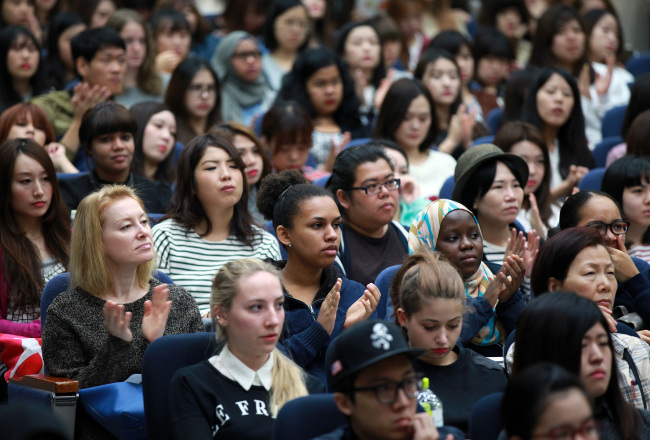A recent study by a local scholar suggested South Korean college students are not very proficient in their mother tongue, with the average student having only basic writing skills.
Song Hyun-jung, an assistant professor of Korean language education at Jeju National University, assessed the writing skills and grammar knowledge of 632 male and female students. The participants were asked to answer 20 questions designed to see if they had the Korean language skills required for higher education.
On a 100-point scale, female students scored 60.27 while their male counterparts averaged 58.72. The results were consistent with that of most major exams in Korea, where girls have generally done better than boys. In last year’s annual college entrance exam, female students got 5.4 more points in standard scores on the Korean section.
 |
Foreign students take part in a Korean speech contest at Ewha Womans University in Seoul on Tuesday ahead of Oct. 9 Hangeul Day. (Yonhap |
In the study, those who scored below 50 were considered to have only elementary language skills, the 50-74 group were seen as possessing basic skills and anyone getting 75 or more was regarded as being fluent in expressing their opinions while able to fluently come up with ideas for writing.
For six of the 20 questions, less than half of the respondents got the correct answer.
Humanities majors did marginally better than those studying sociology and natural sciences with a score of 61.85 compared to 60.52 and 58.04, respectively.
The results indicate that many Korean college students lack sufficient Korean skills for higher education, Song said.
“Generally, writing lessons in most high schools focus on preparing the students solely for college admissions rather than practical writing. As a result, many students enter college without procuring sufficient Korean skills needed in higher education,” she said.
Most of the Korean language lessons in the country train students for exams that have them answer multiple-choice and short-answer questions after reading short excerpts from a literary piece. Students say that because of this, they are able to understand individual sentences, but have trouble grasping the topic of the whole text.
Koreans have among the highest ratio of getting higher education in the world, with 70.9 percent of high school graduates entering college as of 2014. But data shows that even well-educated people lack adequate skills to use their native language.
According to the Korean Educational Development Institute’s education and human resources index, the country had the lowest average document literacy for people with college diplomas out of all members of the Organization for Economic Cooperation and Development.
Some colleges take the matter into their own hands to improve the less-than-satisfactory Korean skills of their students. Hankuk University of Foreign Studies has mandated a writing class for all students, starting with the freshman class of 2007.
“Practical writing is very important, especially in college education,” Song said. “The curriculum should also be based more on the text, so that the student can comprehend the entire context rather than simply understanding the meaning of individual sentences.
The study was published recently in the journal “The Education of Korean Language” by Korean Language Education Research Institute at Seoul National University.
By Yoon Min-sik
(
minsikyoon@heraldcorp.com)








